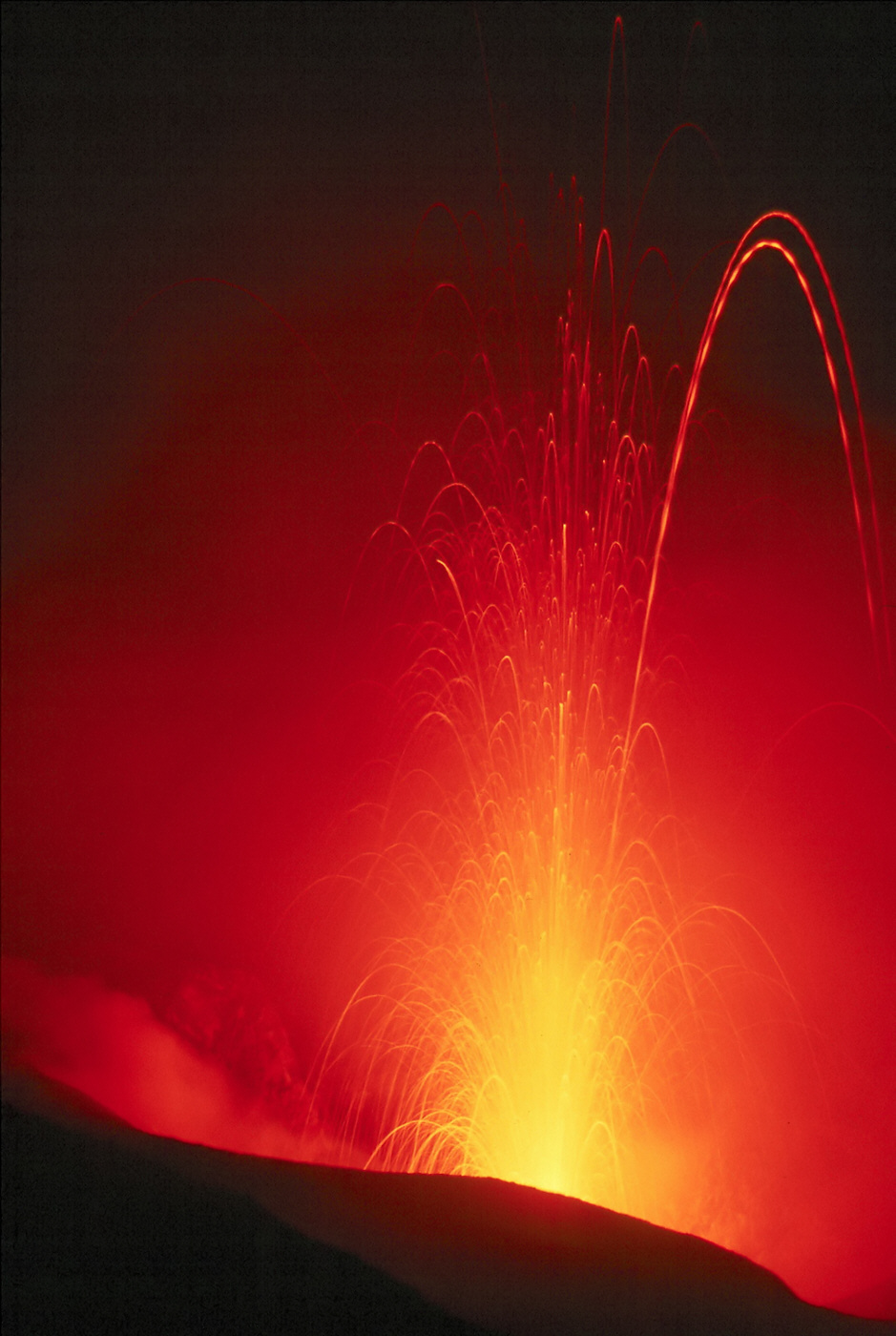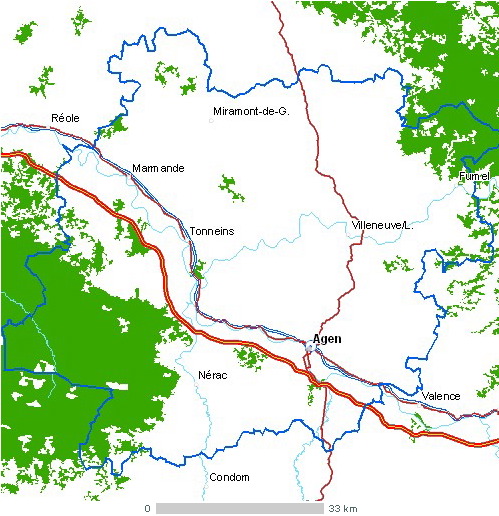|
Jean Baptiste Bory De Saint-Vincent
Jean-Baptiste Geneviève Marcellin Bory de Saint-Vincent was a French naturalist, officer and politician. He was born on 6 July 1778 in Agen (Lot-et-Garonne) and died on 22 December 1846 in Paris. Biologist and geographer, he was particularly interested in volcanology, systematics and botany. Life Youth Jean-Baptiste Bory de Saint Vincent was born at Agen on 6 July 1778. His parents were Géraud Bory de Saint-Vincent and Madeleine de Journu; his father's family were petty nobility who played important roles at the bar and in the judiciary, during and after the French Revolution. Instilled with sentiments hostile to the revolution from childhood,Biography of Jean-Baptiste Bory de Saint-Vincent on the website of the French National Assembly: http://www2.assemblee-nationale.fr/sycomore/fiche/(num_dept)/16507 he studied first at the college of Agen, then with his uncle Journu-Auber in Bordeaux in 1787. He may have attended courses in medicine and surgery from 1791 to 1793. ... [...More Info...] [...Related Items...] OR: [Wikipedia] [Google] [Baidu] |
Agen
The commune of Agen (, ; ) is the prefecture of the Lot-et-Garonne department in Nouvelle-Aquitaine, southwestern France. It lies on the river Garonne southeast of Bordeaux. Geography The city of Agen lies in the southwestern department of Lot-et-Garonne in the Aquitaine region. The city centre lies on the east bank of the river Garonne, the Canal de Garonne flows through the city, approximately halfway between Bordeaux and Toulouse . Climate Agen features an oceanic climate (Cfb), in the Köppen climate classification. Winters are mild and feature cool to cold temperatures while summers are mild and warm. Rainfall is spread equally throughout the year; however, most sunshine hours are from March–September. Toponymy From Occitan ''Agen'' (1197), itself from Latin ''Aginnum'' (3rd century ''Itinéraire d'Antonin''), from a Celtic root ''agin-'' meaning "rock or height". Population Economy The town has a higher level of unemployment than the national average. Major e ... [...More Info...] [...Related Items...] OR: [Wikipedia] [Google] [Baidu] |
Volcanologist
A volcanologist, or volcano scientist, is a geologist who focuses on understanding the formation and eruptive activity of volcanoes. Volcanologists frequently visit volcanoes, sometimes active ones, to observe and monitor volcanic eruptions, collect eruptive products including tephra (such as ash or pumice), rock and lava samples. One major focus of inquiry in recent times is the prediction of eruptions to alleviate the impact on surrounding populations and monitor natural hazards associated with volcanic activity. Geologists who research volcanic materials that make up the solid Earth are referred to as igneous petrologists. Etymology The word ''volcanologist'' (or ''vulcanologist'') is derived from the English volcanology (volcano + -logy), which was derived from the French volcanologie (or vulcanologie), which was further derived from the French word volcan (volcano), which was even further derived from Vulcanus, the Latin name of the Roman god of fire and metalworking ... [...More Info...] [...Related Items...] OR: [Wikipedia] [Google] [Baidu] |
Systematics
Biological systematics is the study of the diversification of living forms, both past and present, and the relationships among living things through time. Relationships are visualized as evolutionary trees (synonyms: cladograms, phylogenetic trees, phylogenies). Phylogenies have two components: branching order (showing group relationships) and branch length (showing amount of evolution). Phylogenetic trees of species and higher taxa are used to study the evolution of traits (e.g., anatomical or molecular characteristics) and the distribution of organisms ( biogeography). Systematics, in other words, is used to understand the evolutionary history of life on Earth. The word systematics is derived from the Latin word ''systema,'' which means systematic arrangement of organisms. Carl Linnaeus used 'Systema Naturae' as the title of his book. Branches and applications In the study of biological systematics, researchers use the different branches to further understand the relations ... [...More Info...] [...Related Items...] OR: [Wikipedia] [Google] [Baidu] |
Volcanology
Volcanology (also spelled vulcanology) is the study of volcanoes, lava, magma and related geological, geophysical and geochemical phenomena (volcanism). The term ''volcanology'' is derived from the Latin word '' vulcan''. Vulcan was the ancient Roman god of fire. A volcanologist is a geologist who studies the eruptive activity and formation of volcanoes and their current and historic eruptions. Volcanologists frequently visit volcanoes, especially active ones, to observe volcanic eruptions, collect eruptive products including tephra (such as ash or pumice), rock and lava samples. One major focus of enquiry is the prediction of eruptions; there is currently no accurate way to do this, but predicting eruptions, like predicting earthquakes, could save many lives. Modern volcanology Volcanologist examining tephra horizons in south-central Iceland. In 1841, the first volcanological observatory, the Vesuvius Observatory, was founded in the Kingdom of the Two Sicil ... [...More Info...] [...Related Items...] OR: [Wikipedia] [Google] [Baidu] |
Geographer
A geographer is a physical scientist, social scientist or humanist whose area of study is geography, the study of Earth's natural environment and human society, including how society and nature interacts. The Greek prefix "geo" means "earth" and the Greek suffix, "graphy," meaning "description," so a geographer is someone who studies the earth. The word "geography" is a Middle French word that is believed to have been first used in 1540. Although geographers are historically known as people who make maps, map making is actually the field of study of cartography, a subset of geography. Geographers do not study only the details of the natural environment or human society, but they also study the reciprocal relationship between these two. For example, they study how the natural environment contributes to human society and how human society affects the natural environment. In particular, physical geographers study the natural environment while human geographers study human society ... [...More Info...] [...Related Items...] OR: [Wikipedia] [Google] [Baidu] |
Biologist
A biologist is a scientist who conducts research in biology. Biologists are interested in studying life on Earth, whether it is an individual cell, a multicellular organism, or a community of interacting populations. They usually specialize in a particular branch (e.g., molecular biology, zoology, and evolutionary biology) of biology and have a specific research focus (e.g., studying malaria or cancer). Biologists who are involved in basic research have the aim of advancing knowledge about the natural world. They conduct their research using the scientific method, which is an empirical method for testing hypotheses. Their discoveries may have applications for some specific purpose such as in biotechnology, which has the goal of developing medically useful products for humans. In modern times, most biologists have one or more academic degrees such as a bachelor's degree plus an advanced degree like a master's degree or a doctorate. Like other scientists, biologi ... [...More Info...] [...Related Items...] OR: [Wikipedia] [Google] [Baidu] |
Lot-et-Garonne
Lot-et-Garonne (, oc, Òlt e Garona) is a department in the Nouvelle-Aquitaine region of Southwestern France. Named after the rivers Lot and Garonne, it had a population of 331,271 in 2019.Populations légales 2019: 47 Lot-et-Garonne INSEE Its prefecture and largest city is Agen. History Lot-et-Garonne is one of the original 83 departments created on 4 March 1790, as a result of the . It was created from part of the province of[...More Info...] [...Related Items...] OR: [Wikipedia] [Google] [Baidu] |
Politician
A politician is a person active in party politics, or a person holding or seeking an elected office in government. Politicians propose, support, reject and create laws that govern the land and by an extension of its people. Broadly speaking, a politician can be anyone who seeks to achieve Power (social and political), political power in a government. Identity Politicians are people who are politically active, especially in party politics. Political positions range from local governments to state governments to federal governments to Intergovernmental organisation, international governments. All ''government leaders'' are considered politicians. Media and rhetoric Politicians are known for their rhetoric, as in speeches or campaign advertisements. They are especially known for using common themes that allow them to develop their political positions in terms familiar to the voters. Politicians of necessity become expert users of the media. Politicians in the 19th century made ... [...More Info...] [...Related Items...] OR: [Wikipedia] [Google] [Baidu] |
Officer (armed Forces)
An officer is a person who holds a position of authority as a member of an armed force or uniformed service. Broadly speaking, "officer" means a commissioned officer, a non-commissioned officer, or a warrant officer. However, absent contextual qualification, the term typically refers only to a force's ''commissioned officers'', the more senior members who derive their authority from a commission from the head of state. Numbers The proportion of officers varies greatly. Commissioned officers typically make up between an eighth and a fifth of modern armed forces personnel. In 2013, officers were the senior 17% of the British armed forces, and the senior 13.7% of the French armed forces. In 2012, officers made up about 18% of the German armed forces, and about 17.2% of the United States armed forces. Historically, however, armed forces have generally had much lower proportions of officers. During the First World War, fewer than 5% of British soldiers were officers (part ... [...More Info...] [...Related Items...] OR: [Wikipedia] [Google] [Baidu] |
Chamber Of Deputies (France)
Chamber of Deputies (french: Chambre des députés) was a parliamentary body in France in the nineteenth and twentieth centuries: * 1814–1848 during the Bourbon Restoration and the July Monarchy, the Chamber of Deputies was the lower house of the French Parliament, elected by census suffrage. * 1875–1940 during the French Third Republic, the Chamber of Deputies was the legislative assembly of the French Parliament, elected by universal suffrage. When reunited with the Senate in Versailles, the French Parliament was called the National Assembly (''Assemblée nationale'') and carried out the election of the president of the French Republic. During the Bourbon Restoration Created by the Charter of 1814 and replacing the Corps législatif, which existed under the First French Empire, the Chamber of Deputies was composed of individuals elected by census suffrage. Its role was to discuss laws and, most importantly, to vote taxes. According to the Charter, deputies were el ... [...More Info...] [...Related Items...] OR: [Wikipedia] [Google] [Baidu] |
Chamber Of Representatives (France)
The Chamber of Representatives (french: Chambre des représentants) was the popularly elected lower body of the French Parliament set up under the Charter of 1815. The body had 629 members who were to serve five-year terms. The upper body was the Chamber of Peers. History Jean Denis, comte Lanjuinais served as president of this body while it existed. The Chamber of Representatives was short-lived. At the end of the Hundred Days, with the defeat of Napoleon at Waterloo, the chamber issued Napoleon a demand for abdication as Emperor of the French. On 22 June 1815 the Chamber of Representatives elected three members ( Carnot, the duc d'Otrante, and the comte Grenier) of a five-member commission, the ''Commission de gouvernement'', to constitute a new government, and on 23 June 1815 the Chamber of Representatives named Napoleon II as Emperor. The allied powers of the Seventh Coalition soon occupied Paris, and the chamber capitulated on 3 July. It soon became clear that the occ ... [...More Info...] [...Related Items...] OR: [Wikipedia] [Google] [Baidu] |







